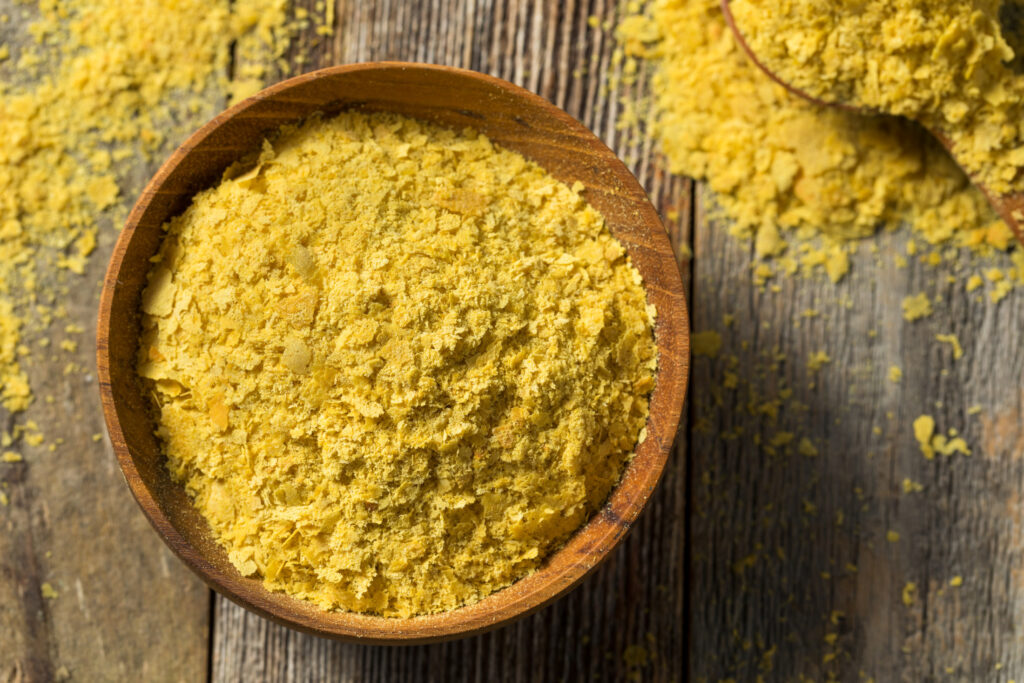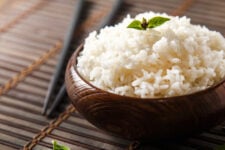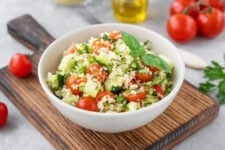Nutritional yeast is beneficial because of its nutrient density and the health-promoting properties it offers. Used to supplement the diet, it provides fiber, protein, antioxidants, vitamins, and minerals. Let’s explore why adding nutritional yeast to your diet could be a great choice for you!

Health Benefits of Nutritional Yeast
In order to understand why nutritional yeast could be a beneficial addition to the diet, we’ll explore what it is, how it can support your health, who should and shouldn’t use it, the nutrient comparison of different types, as well as how to implement it into your diet.
What is Nutritional Yeast?
Nutritional Yeast is a dietary supplement that consists of a yeast cell called Saccharomyces cerevisiae as well as either naturally occurring or fortified vitamins and minerals. Purposefully grown, pasteurized, and then dried, this deactivated yeast can be taken in flake, powder, and tablet form.
You may also see this called “nooch,” which is just a nickname given to nutritional yeast. Although it’s most commonly used like a spice or condiment and added to food to enhance flavor and add nutritional value, it can also be taken like a vitamin/mineral supplement and ingested as a tablet.

Nutritional yeast shouldn’t be confused with Brewer’s Yeast (deactivated yeast derived from the beer brewing process) or Baker’s Yeast (live yeast used to leaven bread).
How can nutritional yeast support health?
Nutritional yeast provides health-supporting components like beta glucans, amino acids, antioxidants, vitamins, and minerals. Read on to get the detailed scoop about each of these components, which is backed by clinical research.
Source of Beta Glucans
Beta glucans are found naturally in the cell wall of yeast, have been well-researched, and are immunomodulators that help regulate the immune system (1, 2). Beta glucans have prebiotic properties, which means they promote the growth of beneficial gut microorganisms and support a healthy environment in the intestines (3, 4, 5, 6, 7).
Clinical research has studied and proven the cholesterol-lowering and glucose-lowering capacity of beta glucans, beneficial for the prevention and treatment of both high cholesterol and diabetes (4, 8, 9, 10).
In cancer research, beta glucans have been used to promote tumor regression as well as to help improve the physical and mental states of cancer patients (11, 12, 13).
Two clinical trial results have shown a reduced rate of cold/flu infections, reduced cold/flu symptoms, and shortened duration among subjects assigned to take nutritional yeast, when compared to those who took a placebo (14, 15). One study on athletes found that giving a yeast supplement prior to exercise can reduce the body’s response to stress and aid in a more robust response to infections (16).
Source of Amino Acids
Amino acids are used by our bodies to make protein, which is vital for many important bodily functions. Nutritional yeast provides a great source of amino acids, including some of the nine essential amino acids that our bodies can’t make and therefore must be derived from food (17).
Source of Antioxidants
Several antioxidants (including glutathione) are found naturally in the yeast strain used to make nutritional yeast (18, 19). Antioxidants act in the body to prevent or delay cell damage, making them very important for optimal health (20).
Source of Vitamins and Minerals
Nutritional yeast provides a source of the B vitamins thiamin, riboflavin, niacin, B6, B12, pantothenic acid, and folate (21). Product brand and notified versus unfortified status will impact how much of each B vitamin you will get from each serving of nutritional yeast (read on to see a comparison).
You’ll also get several minerals in varying amounts, including chromium, selenium, potassium, zinc, iron, copper, magnesium, sodium, and manganese. Particularly noteworthy, chromium aids in blood glucose level regulation and selenium helps maintain a healthy immune system (21).
Who could benefit from nutritional yeast?
Most healthy adults could benefit from using nutritional yeast, although please read on about avoidance with certain medical conditions and prescription medication interactions. Nutritional yeast would be a great addition to many diets, particularly vegan, vegetarian, gluten-free, dairy-free, low-FODMAP, DASH, and Mediterranean, among others.
What about children? There aren’t any professionally published guidelines from regulatory bodies or evidence-based studies to support the safe use in pediatrics. However, if a caregiver independently chooses to add nutritional yeast to a child’s diet, there are several precautions to consider.
Children require lesser daily amounts of vitamins, minerals, and dietary fiber, all of which are present in varying (sometimes high) amounts in nutritional yeast. Also, some brands were found to have detectable lead levels, so be sure to do some research before choosing a brand to use for your family (22).
Who shouldn’t take nutritional yeast?
Any adult following a low-tyramine diet or a low-purine diet should avoid nutritional yeast. Tyramine and purines are naturally present in yeast, making nutritional yeast potentially problematic for migraine sufferers, those with gout, kidney stones, or those taking certain prescription medications (22, 23).
Adults taking prescription medication shouldn’t take nutritional yeast without first checking with a licensed doctor about a possible interaction. There is a known food-drug interaction between nutritional yeast and some MAOI antidepressants, certain narcotics, and diabetes medications (24, 25, 26).
Also, adults with Inflammatory Bowel Disease (IBD), including Crohn’s disease, or who are immunocompromised, shouldn’t take nutritional yeast. Crohn’s disease symptoms were found to worsen with the ingestion of yeast and the high-purine content of yeast could increase the inflammation seen in IBD (27, 28, 29, 30).
Lastly, anyone with an allergy or sensitivity to yeast should avoid using nutritional yeast.
Nutritional Yeast Flakes Nutrition Facts
Using ESHA’s professional food and nutrition database (31), we analyzed two different brands of nutritional yeast flakes to compare the nutrient differences between fortified versus non-fortified. Here is the nutrient breakdown for a 2 Tablespoon serving size:
- Now Foods brand (Fortified): 60 Calories, 1 g Fat, 5 g Carbohydrate, 4 g Fiber, 9 g Protein, greater than 100% RDA for B Vitamins Thiamin, Riboflavin, Niacin, B6, and B12, 20% RDA for Pantothenic Acids, nearly 40% RDA for Selenium, and contains a small amount of Sodium, Potassium, and Iron
- Anthony’s brand (Unfortified): 60 calories, 1 g Fat, 5 g Carbohydrate, 4 g Fiber, 8 g protein, 40% RDA for Iron, 8% RDA for Potassium, and a small amount of Sodium and Calcium
Looking at both types, you can see that both are comparable in terms of calories and macronutrient content (Fat, carbs, protein). However, the fortified nutritional yeast will provide a plethora of B vitamins while the unfortified version will provide a good source of iron.
Why limit yourself to one type? If you are following a diet plan that requires special attention to make sure you’re getting enough iron and certain B vitamins (for example, a vegan or vegetarian), you can alternate using the fortified and unfortified versions to get the right balance of nutrients from each type.
Can you take nutritional yeast every day?
Follow the label instructions for the brand you have chosen, but generally speaking, up to 2 Tablespoons per day of nutritional yeast would be a safe amount to use.
If you’ve heard about the Prop 65 warning for potential lead exposure, Dr. Michael Greger, M.D., has done his own research on the topic of lead contamination in nutritional yeast (32). He tested 8 different brands and the laboratory results showed that taking up to 2 Tablespoons per day was still well within safe limits.
How do you use it?
Use nutritional yeast flakes or powder on your food or in recipes as you would use a spice or grated cheese. The umami, cheesy flavor profile makes this quite easy to add to foods and incorporate into many savory dishes.
Some simple ways to incorporate nutritional yeast into your diet include adding a cheesy taste to your popcorn, making a “cheese” sauce for your veggie or pasta dishes, or using this in place of cheese to sprinkle on your soup. Get creative in the kitchen and experiment with all of the ways you add some nooch to your food and recipes!
Follow the old rule of thumb that more is not always better and be sure to stick to the maximum 2 Tablespoon serving size per day.
If you’re looking to take nutritional yeast in tablet form, be aware that the dosage varies from brand to brand. A quick search reveals that you can expect to take anywhere from one to nine tablets per day, depending on the brand (33, 34).
Let’s help you get started with this amazing and versatile nutritional yeast cheese sauce recipe. Enjoy!
Nutritional Yeast Cheese Sauce
Equipment
- 1 blender
- 1 non-stick saucepan
- 1 silicone spatula
Ingredients
- 1 cup plant-based milk
- 2 tbsp refined coconut oil (melted) or extra virgin olive oil
- 3 tbsp nutritional yeast
- 2 tbsp tapioca starch
- 2 tbsp lemon juice
- 1/2 tsp sea salt
- 1/2 tsp onion powder
- 1/2 tsp garlic powder
Instructions
- Combine all ingredients in a blender and process until you have a smooth consistency.
- Pour the contents of your blender into a saucepan. Gently heat it on medium heat until the mixture starts to thicken. Be sure to stir the mixture continuously with a spatula.
- Remove your cheese sauce from heat and use immediately.
Notes
- You can use any non-dairy milk of choice to accommodate allergies.
- For a more “cheesy” color, you can use a small amount of turmeric, paprika, or beta carotene. But don’t worry, this nutritional yeast cheese sauce tastes amazing even without these additives.
- If you want to add a smoky note to your queso, add a drop of liquid smoke, or use smoked paprika.







